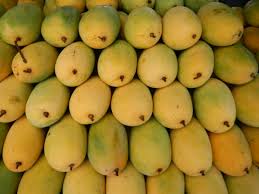New experiments for more mangoes by NAIP brings hope for growers
 KOLKATA/DELHI: How about producing more mangoes, a fruit of rich and poor, to keep the fruit still economically accessible for all, despite the often man-made inflationary pressures?
KOLKATA/DELHI: How about producing more mangoes, a fruit of rich and poor, to keep the fruit still economically accessible for all, despite the often man-made inflationary pressures?
A recent experiment carried out by the National Agricultural Innovation Project (NAIP), under Indian Council of Agricultural Research (ICAR) on a few varieties of mangoes in Gujarat and Tamilnadu has produced magical results with ‘kesar’ and other mango varieties which bore good results not only for domestic markets but also in earning good foreign exchange from global markets.
According to sources in NAIP, mango cultivation, particularly in Gujarat and Tamilnadu has got a boost with the innovations carried out effectively by the institute in collaboration with planters.
Under the experiment, sub-project ‘a value chain on mango and guava for domestic and export market’ was initiated.
Mango lovers would be delighted to know that it is even available during off-season period starting from October to December in both these states.
As the consortium partners of the value chain on mango, Tamilnadu Agricultural University, Trichy, Navsari Agricultural University, Navsari, Gujarat and Andhra Pradesh Horticultural University have also joined in to carry out extensive research and came out with innovative ways of increasing the mango yield. “The innovative methods adopted like canopy management, pruning, drip irrigation system, bio-fertilizer, micro nutrients, use of Paclobutrazol to induce flowers, use of fruit fly trap to control mango fruit flies, tractor trolley mounted mango harvester machine to reduce harvest loss, along with adoption of scientific fruit ripening techniques etc. have given a fillip to mango cultivation,’’ a scientist said.
Incidentally, the yield of mango per hectare has gone up from the normal 5.95 ton to 9.10 ton and the damage to the crop has decreased to 17 percent from the normal 30 percent.
The technique of using Paclobutrazol to induce flowers during off- season period has made available mango even during off-season, fetching higher price of Rs 50 to Rs 70 per kilogram when compared to Rs 7 to Rs 25 per kilogram during normal season.
The technologies developed under the value chain include technology for frozen mango pulp, mango bar processing, mango pulp canning, spray drying of ripe mango power production, ripe mango slices dehydration, mango kernel oil extraction, mango pappad production, ripening of mango by ethephone as well as ethylene gas, specially designed CFB boxes for packing Kesar mango etc.
For providing linkages for export of fresh fruits, NAIP has facilitated setting up of mango growers associations which are directly linked with exporters, retail chain stores and processors.
Vocational training given to the mango farmers in Tamilnadu on “Value addition” has also resulted in the establishment of three mango- based industries in the project site.
Through this project, technical logistics were provided to the project farmers. One of the project farmers, viz., V.G.Sittrarasu has established a “Post Harvest Packaging and Storage facility” at Ottatheru, Pochampalli.
He has established a unit for a capacity of 100 tonnes and this facility is being extended to others who are involved in mango processing and marketing.
NAIP has made it a point to train the farmers on Good Agricultural Practices (GAP) and the farmers are going for GAP certification for which M/s. Jain Irrigation, Jalgoan, Maharashtra is assisting to get JAIN GAP certificate.
This will facilitate better pricing and adoption of latest technologies continuously by the farmers. Another intervention or novel idea is to provide information about day to day market price of mango to the farmers to enable them to have a better negotiated price.

